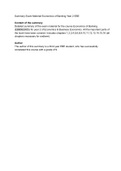Summary Exam Material Economics of Banking Year 2 EBE
Content of the summary
Detailed summary of the exam material for the course Economics of Banking
(EBB062A05) for year 2 of Economics & Business Economics. All the important parts of
the book have been covered. Includes chapters 1,2,3,4,5,6,8,9,10,11,12,13,14,15,16 (all
chapters necessary for endterm).
Author
The author of this summary is a third year EBE student, who has successfully
completed this course with a grade of 9.
,Chapter 1: Why study money, banking and financial markets?
WHY STUDY FINANCIAL MARKETS
- Financial markets = markets in which funds are transferred from people who have an
excess of available funds to people who have a shortage
- Bond & stock markets
- Greater economic efficiency
- Security (financial instrument) = a claim on the issuer’s future income or assets (any
financial claim or piece of property that is subject to ownership).
- Bond = a debt security that promises to make payments periodically for a specified
period of time
Bond market enables corporations and governments to borrow to finance their activities and
because it is where interest rates are determined.
- Interest rate = cost of borrowing or the price paid for the rental of funds (mortgage
interest rates, car loan rates, and interest rates on many different types of bonds)
- high interest rates could encourage you to save because you can earn more
interest income by putting aside some of your earnings as savings
- High interest rates, for example, might cause a company to postpone building a
new plant that would provide more jobs.
Because different interest rates have a tendency to move in unison, economists frequently lump
interest rates together and refer to ‘the’ interest rate → BUT: interest rates on several types of
financial instruments can differ substantially.
- ex: Italy had traditionally higher inflation in the past than Germany and Italian bonds had
to pay a higher rate of interest to compensate for this risk
> Stock market
- Common stock = share of ownership in a corporation
- Issuing stock and selling it to the public is a way for corporations to raise funds to finance
their activities.
- These considerable fluctuations in stock prices affect the size of people’s wealth and as
a result may affect their willingness to spend.
- !!! The stock market is also an important factor in business investment decisions,
because the price of shares affects the amount of funds that can be raised by selling
newly issued stock to finance investment spending [A higher price for a firm’s shares
means that it can raise a larger amount of funds, which it can use to buy production
facilities and equipment]
> Foreign exchange market
1
, - When funds are transferred from one country to another, they have to be converted from
the currency of the country of origin (say sterling or euros) into the currency of the
country they are going to (say US dollars)
- Foreign exchange market = market where one currency is bought and sold using
another currency.
- Foreign exchange rate = price at which one currency is exchanged for another
- Ex: both the euro and the pound sterling fell in 2008, reflecting the fall in demand for
sterling and the euro during the global financial crisis.
WHY STUDY FINANCIAL INSTITUTIONS AND BANKING
> Structure of financial system
- comprising many different types of private sector financial institutions, including banks,
insurance companies, mutual funds, finance companies and investment banks, all of
which are heavily regulated by the government
- Ex: individual wants to make loan → he or she would lend to such companies indirectly
through financial intermediaries, institutions that borrow funds from people who have
saved and in turn make loans to others [NOT go directly to company]
> Financial crises
- = major disruptions in financial markets that are characterized by sharp declines in asset
prices and the failures of many financial and non-financial firms
- 2007: Defaults in subprime residential mortgages led to major losses in financial
institutions
- The interconnectedness of the international financial system meant that the financial
crisis that began in the United States was rapidly passed on to the rest of the world,
resulting in the global financial crisis and the onset of the ‘great recession’.
> Banks & other financial institutions
- Banks = financial institutions that accept deposits and make loans
- commercial banks, building societies (in the UK), mutual savings banks and
credit unions
- other financial institutions such as insurance companies, finance companies, pension
funds, mutual funds and investment banks have been growing at the expense of banks
> Financial innovation
- E-finance = new means of delivering financial services electronically
- We also study financial innovation because it shows us how creative thinking on the part
of financial institutions can lead to higher profits
2






